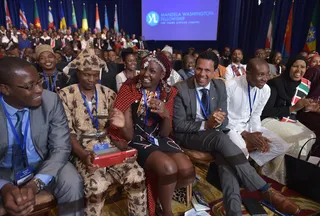Coming to America: Young African Leaders Vibe With Obama
Obama holds town hall meeting with Mandela fellows.

1 / 14
They Are the Change - Four years ago President Obama launched the Young African Leaders Initiative to "tap into the incredible talent and creativity of young Africans." If their continent is to live up to its full potential, young adults must be actively engaged, Obama told the 500 participants in YALI's inaugural Washington Fellowship program. Continue reading to learn more about the program, the fellows and a few words of advice from an American president. —Joyce Jones (@BETpolitichick) Photo: AP Photo/Jacquelyn Martin)

2 / 14
The Washington Fellowship - The president decided to create the Washington Fellowship for young African leaders after a trip last year to South Africa. "The objective was to give young Africans the opportunity to come to the United States and develop their skills as the next generation of leaders in civil society and business and government," Obama told the young leaders. (Photo: MANDEL NGAN/AFP/Getty Images)

3 / 14
By Any Means Necessary - "And the response was overwhelming. Across the continent, young men and women set out on a journey. In remote villages with no phones and Internet, they navigated the back roads, and they traveled by bus and train to reach larger towns and cities — just to get an online application for the program. One young woman from rural Zimbabwe took a five-hour bus ride, then another six-hour bus ride, then another seven-hour bus ride — a two-day journey — just to get her interview," the president said. Ultimately, 50,000 "extraordinary" people applied for the 500 slots in the program. (Photo: Jed Lipinski, NOLA.com/TIMES-PICAYUNE /LANDOV)

4 / 14
New Name, Same Spirit - The Washington Fellowship program is now the Mandela Washington Fellowship for Young African Leaders, in honor of the late South African president Nelson Mandela. Obama said the Mandela family gave the name change its full support. (Photo: Chris Jackson/Getty Images)

5 / 14
The Class of 2014 - The fellows are between 25 and 35 years old and represent all 49 countries in sub-Saharan Africa. The class of 500 is also made up of an equal number of men and women. More than 75 percent of the fellows hold mid-level or executive positions and 48 percent hold graduate degrees. Twenty-five percent work in a non-governmental institution and 39 percent are business owners. (Photo: MANDEL NGAN/AFP/Getty Images)
Photo By Photo: MANDEL NGAN/AFP/Getty Images
ADVERTISEMENT

6 / 14
Hosts With the Most - Twenty institutions of higher education across the nation hosted the fellowship program. They included Ivy League schools like Yale and Dartmouth; top state universities such as University of California Berkley and University of Texas at Austin; and prestigious HBCUs, including Howard University and Clark Atlanta University. They also will participate in internships at some of the nation's leading companies and organizations. (Photo: The Washington Times /Landov)

7 / 14
Leadership Is Local - Four regional leadership centers will be set up in Kenya, Senegal, Ghana and South Africa in 2015 to provide access to training, technology and professional development and entrepreneurship opportunities. (Photo: REUTERS/Thomas Mukoya)

8 / 14
Matchmaking - Fellows are matched with industry leaders from major international companies and U.S. organizations that have operations in Africa who will mentor them after they return home. In addition, fellows will have access to seed funding to start or enhance a business or social enterprise. (Photo: Mint Images - Tim Robbins/Getty Images)

9 / 14
Virtual Assistance - YALI members will receive access to online courses and training materials, as well as virtual mentoring and networking opportunities. In addition, they will have access to tailored Web-training videos on topics such as leadership, entrepreneurship, civic and public engagement taught by professors at American universities and other experts. The fellows also will be able to connect via "Meetups" on the YALI Network website. (Photo: Jamie Grill/Getty Images)
Photo By Photo: Jamie Grill/Getty Images
![Womens' Liberation - "If you look comparatively at countries around the world, what societies succeed, which ones don’t, one of the single-best measures of whether a country succeeds or not is how it treats its women. … If you are not empowering half of your population that means you have half as few possible scientists, half as few possible engineers," Obama advised. "You are crippling your own development unnecessarily. So that’s point number one. [If] you educate and empower and respect a mother, then you are educating the children, right? So with a man, you educate him, yeah, it’s OK. A woman, you educate her, and suddenly you’ve got an entire village, an entire region, an entire country suddenly is becoming educated." (Photo: Junior D. Kannah/AFP/Getty Images)](https://images.paramount.tech/uri/mgid:arc:imageassetref:bet.com:ae35a36b-2948-420c-a922-c588f82ed8b6?format=webp&width=320)
10 / 14
Womens' Liberation - "If you look comparatively at countries around the world, what societies succeed, which ones don’t, one of the single-best measures of whether a country succeeds or not is how it treats its women. … If you are not empowering half of your population that means you have half as few possible scientists, half as few possible engineers," Obama advised. "You are crippling your own development unnecessarily. So that’s point number one. [If] you educate and empower and respect a mother, then you are educating the children, right? So with a man, you educate him, yeah, it’s OK. A woman, you educate her, and suddenly you’ve got an entire village, an entire region, an entire country suddenly is becoming educated." (Photo: Junior D. Kannah/AFP/Getty Images)
ADVERTISEMENT

11 / 14
The Times Are Changing - "As a continent, you have to update and create new traditions. And that’s where young people come in. You don’t have to accept what’s the old ways of doing things. You can respect the past and respect traditions while recognizing they have to be adapted to a new age," Obama said. (Photo: AP Photo/Jacquelyn Martin)
![Dambala Garba, Nigeria, 32 - "I am a human rights lawyer with a particular focus on the right of prisoners. I spent six weeks at Florida International University studying public management. I learned about how to manage people, bring youth together in Nigeria and promote human rights culture in our society. It was amazing meeting people from different countries, cultures and backgrounds. It actually taught me how to work with different people [with diverse views]. The most important lesson I learned was about leadership, particularly understanding myself and the kind of leader I am. If you don't understand yourself you can't understand others." (Photo: Joyce Jones/BET)](https://images.paramount.tech/uri/mgid:arc:imageassetref:bet.com:ae35a36b-2948-420c-a922-c588f82ed8b6?format=webp&width=320)
12 / 14
Dambala Garba, Nigeria, 32 - "I am a human rights lawyer with a particular focus on the right of prisoners. I spent six weeks at Florida International University studying public management. I learned about how to manage people, bring youth together in Nigeria and promote human rights culture in our society. It was amazing meeting people from different countries, cultures and backgrounds. It actually taught me how to work with different people [with diverse views]. The most important lesson I learned was about leadership, particularly understanding myself and the kind of leader I am. If you don't understand yourself you can't understand others." (Photo: Joyce Jones/BET)

13 / 14
Regina Kpotor, Togo, 32 - "I'm a public procurement specialist for the Ministry of Finance. When I return home I want to share with my colleagues the freedom I witnessed and the way people here are engaged in their communities: the commitment they make to their communities and the way they're free to say what they really think. I want to encourage that same freedom and respect." (Photo: Joyce Jones/BET)
![Believe in Africa - "Sobel Ngom from Senegal has a wonderful quote. He has a wonderful quote. He said, 'Here, I have met Africa, the [Africa] I have always believed in. She’s beautiful. She’s young. She’s full of talent and motivation and ambition.' And that’s a good description," President Obama said in his closing remarks. "I want to thank you for inspiring us with your talent and your motivation and your ambition. You’ve got great aspirations for your countries and your continent. And as you build that brighter future that you imagine, I want to make sure that the United States of America is going to be your friend and partner every step of the way." (Photo: AP Photo/Manuel Balce Ceneta)](https://images.paramount.tech/uri/mgid:arc:imageassetref:bet.com:ae35a36b-2948-420c-a922-c588f82ed8b6?format=webp&width=320)